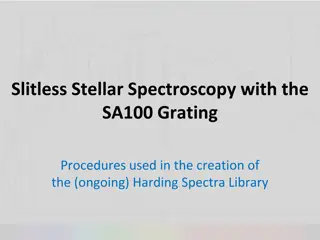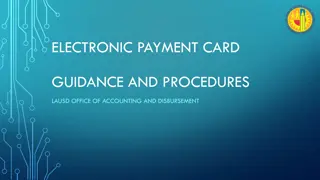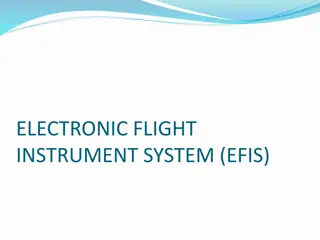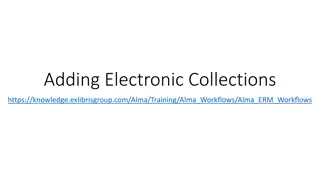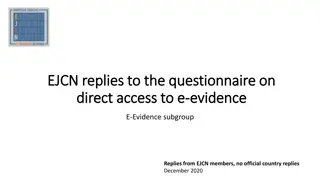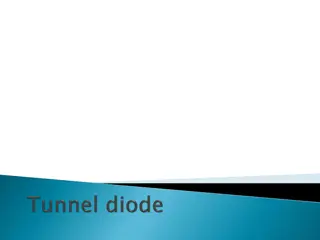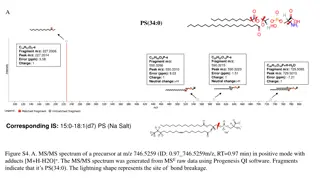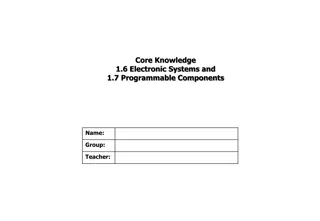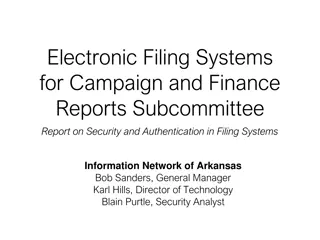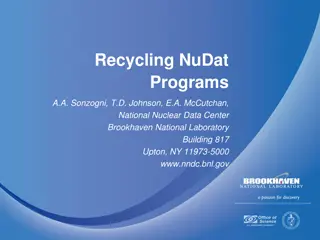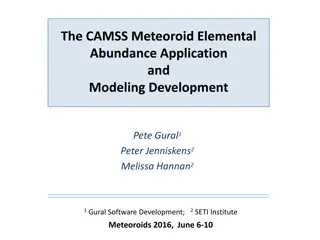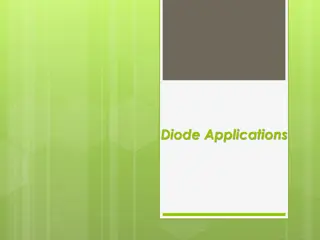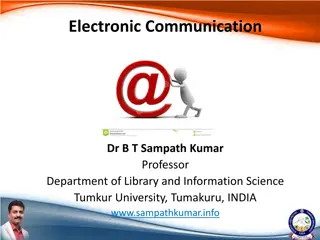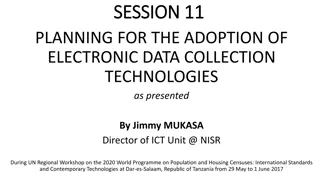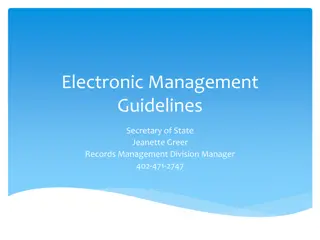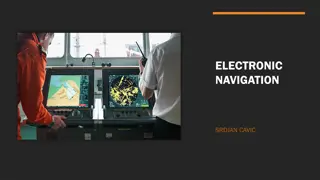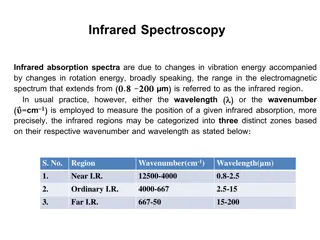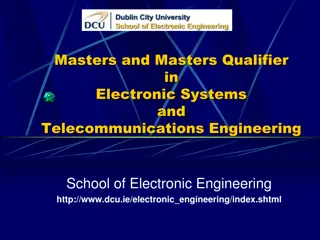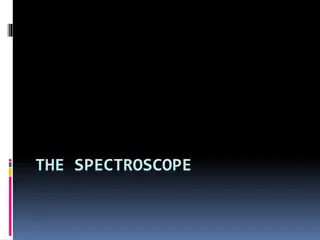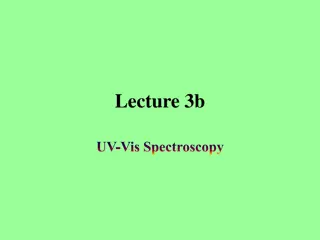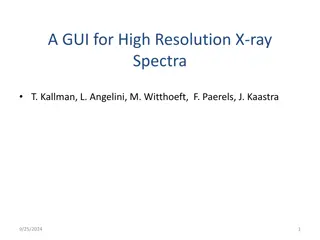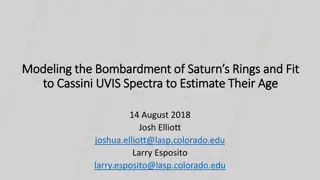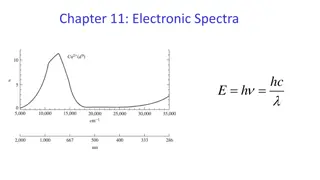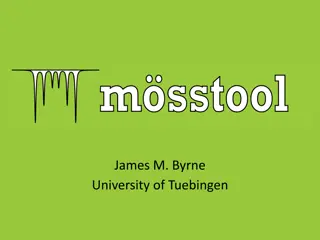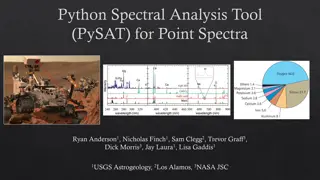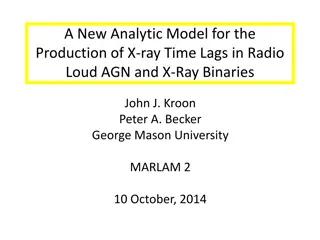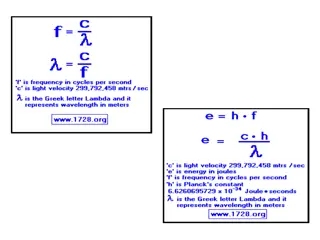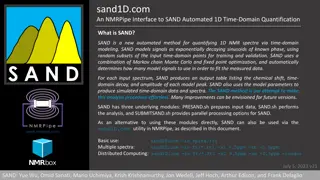ELECTRONIC VOTING PC HOME AFFAIRS March 2023
Delve into the realm of electronic voting systems with a comprehensive examination of defining e-voting, its types, global status, and valuable lessons learned from past experiences. Explore the controlled and uncontrolled environments of e-voting, including EVMs, DREs, and emerging technologies lik
0 views • 21 slides
IEEE Council on Electronic Design Automation (CEDA) - Empowering Innovation in Electronic Circuits and Systems
IEEE CEDA, established in 2005, focuses on the theory, implementation, and utilization of EDA/CAD tools for designing integrated electronic circuits and systems. The organization aims to lead in providing technical information and community services related to the design and automation of electronic
3 views • 19 slides
Spectra On-Prem Glacier Solutions Overview
Spectra Logic offers stability and consistency in data storage and management with a focus on innovation. Their solutions include front-end and back-end policy engines to efficiently archive data across different storage mediums like spinning disk, tape, and cloud. The Whiteboard Presentation Summar
0 views • 14 slides
Understanding the New Electronic and Online Notarization Law
The article explores the evolution of notarial acts, including Remote Online Notarization (RON), Electronic Notarization, and considerations for Unauthorized Practice of Law (UPL). It discusses the challenges and opportunities presented by electronic and remote notarization methods, as well as insig
1 views • 24 slides
Slitless Stellar Spectroscopy with the SA100 Grating Procedures
Explore the world of slitless stellar spectroscopy with the SA100 grating as detailed by Anthony Harding in the ongoing creation of the Harding Spectra Library. Learn about the equipment used, the process of determining instrument response, capture procedures, and stacking techniques for obtaining s
0 views • 30 slides
LAUSD Electronic Payment Card Guidance and Procedures
LAUSD Office of Accounting and Disbursement provides detailed guidance and procedures for electronic payment card services, including establishing services, acceptance procedures, terminal operation, reports, and more. Merchants within LAUSD are guided on how to handle electronic transactions secure
1 views • 30 slides
Understanding Electronic Flight Instrument System (EFIS)
An Electronic Flight Instrument System (EFIS) replaces traditional flight deck instruments with electronic displays like the Primary Flight Display (PFD) and Multi-Function Display (MFD). EFIS enhances situational awareness for pilots by consolidating critical flight data in a single, easy-to-read i
0 views • 12 slides
Efficient Workflow for Adding Electronic Collections in Alma
Detailed guidance on ordering, activating, and managing electronic collections in Alma's ERM module. Learn about roles, purchase types, resources, CDI functionality, link resolver, parser parameters, and more. Understand the importance of portfolios and services in providing access to electronic res
0 views • 25 slides
Implementation of Legal Frameworks for Electronic Evidence Gathering
The document provides insights into the legal frameworks governing direct access to electronic evidence in various countries. It covers aspects such as extended searches, access based on lawfully obtained credentials, and online searches. The responses highlight the availability and limitations of i
0 views • 5 slides
Arts Pathways in Electronic Arts Studies
Explore the diverse pathways in Electronic Arts Studies through courses like Advanced Digital Imaging, 3D Animation, and Art History. Choose from a range of interdisciplinary courses to tailor your minor in Electronic Arts. Dive into areas such as video production, graphic storytelling, and new medi
0 views • 55 slides
Understanding Tunnel Diode: A High-Speed Solid-State Electronic Device
Tunnel diode, a heavily doped solid-state electronic device, displays negative resistance due to the phenomenon of Tunneling. It is utilized as a fast-switching component in computers, with germanium being a common material used to manufacture it. The depletion region's width in a tunnel diode is ex
0 views • 15 slides
Mass Spectrometry Analysis of Lipid Species
Detailed mass spectrometry data for various lipid species including APS(34:0), PI(O-36:1), C24(OH) Sulfatide, and PE(O-33:0) is provided in positive mode with corresponding adducts and neutral changes. The MS/MS spectra reveal fragment ions and structural information for each lipid species, aiding i
1 views • 4 slides
Understanding Electronic Systems and Programmable Components
Dive into the world of electronic systems and programmable components by exploring key terms, sensors like Light Dependent Resistor and Thermistor, control devices, circuit components, and flow charts. Learn about inputs, outputs, feedback loops, and how to design simple routines for controlling out
1 views • 6 slides
Maryland Department of Health ePREP Overview for Providers
Maryland Department of Health's ePREP (electronic Provider Revalidation and Enrollment Portal) streamlines the provider enrollment process by allowing electronic applications, automated reviews, and communication within the platform. Managed by the Medicaid system with the involvement of the Develop
0 views • 15 slides
AD Altare Dei Youth Manual Electronic Version Overview
The AD Altare Dei Youth Manual Electronic Version (e-AAD) serves as an alternative method for Scouts to record their answers, especially beneficial for Lone Scouts or those in remote areas. With practical adjustments and web-based features, the e-AAD offers accessibility, versatility, and interactiv
0 views • 27 slides
Security and Authentication in Electronic Filing Systems: Arkansas Subcommittee Report
Explore the subcommittee report on security and authentication in electronic filing systems for campaign and finance reports in Arkansas. Learn about user authentication, risks, mitigation strategies, and approaches used in other states. Discover the filing processes in both paper and electronic for
0 views • 24 slides
Nuclear Data Recycling Using NuDat Programs
Explore the use of NuDat classes in plotting beta-minus decay half-lives, electron capture processes, reliable ECp values, and antineutrino spectra calculations. Delve into topics like cross-section spectra, thermal fission yields, and the decay of various nuclides. The research also discusses assum
0 views • 14 slides
CAMSS Meteoroid Elemental Abundance Application and Modeling Development
Cameras for All-sky Meteor Surveillance Spectroscopy (CAMSS) aims to obtain meteoroid elemental abundances through relative ratios and absolute atom counts, sampling from comets and asteroids. The system uses grating cameras with high resolutions to automate spectral analysis processes. The CAMSS Co
0 views • 14 slides
Understanding Diode Applications in Modern Electronic Systems
Diodes are essential semiconductor components with various applications in electronic systems. They allow current flow in one direction, serving as one-way switches. Diodes are used in communication systems, computers, power supplies, televisions, radar circuits, and more. One significant applicatio
1 views • 19 slides
Understanding Electronic Components in Circuits
An electrical circuit converts energy while an electronic circuit processes information. Electronic components like buzzer, diode, LED, and LDR play essential roles in circuit operations. Learn about the functions and symbols of these components, including forward and reverse bias in diodes.
1 views • 14 slides
Journey Through Science: Labs, Spectra, and Mentors
Explore a visual journey through various scientific labs, equipment, and notable personalities in the field of chemistry, including Giauque Low Temperature Lab at UC Berkeley, advanced measuring systems, and insights into the lives of renowned scientists like E. Bright Wilson and Doc Fong. Witness t
0 views • 13 slides
Understanding Electronic Communication in the Digital Age
Electronic communication has revolutionized the way we exchange information, enabling rapid transmission, wide coverage globally, and cost-effectiveness. This form of communication allows for instant feedback, accessibility 24/7, and various tools like email for seamless correspondence. Explore the
1 views • 23 slides
Adoption of Electronic Data Collection Technologies in Population Census Planning
Presentation by Jimmy Mukasa at a UN Regional Workshop focusing on the adoption of electronic data collection technologies for the 2020 World Programme on Population and Housing Censuses. The discussion includes past experiences, future plans, advantages of using Computer-Assisted Personal Interview
0 views • 22 slides
Best Practices for Electronic Records Management
Electronic records management guidelines outlined by Secretary of State Jeanette Greer emphasize the importance of retaining and managing electronic records effectively. Understanding the definition of records, handling cluttered records retention, and managing electronic records properly are crucia
1 views • 19 slides
Exploring Electronic Navigation Technologies
Electronic navigation technologies, such as satellite navigation, radio navigation, and radar navigation, utilize electricity-powered systems for precise positioning and tracking. Satellite navigation systems rely on signals from satellites for autonomous geo-spatial positioning, while radio navigat
0 views • 9 slides
Understanding Infrared Spectroscopy: An Overview of Vibration Energy and Spectral Regions
Infrared spectroscopy involves analyzing absorption spectra resulting from changes in vibration and rotation energy in molecules. The infrared region spans from 0.8 to 200 μm, with distinct zones categorized based on wavenumber and wavelength. Group frequencies and fingerprint regions offer detaile
1 views • 26 slides
Managing Draft & Proposed Clean Air Act Permits Using Electronic Permit System
Explore how the Electronic Permit System (EPS) streamlines the management of Clean Air Act permits, reducing paper usage, easing document handling, and lowering costs. Learn about the various requirements, tools, and practices involved in the permit process as outlined by the EPA Region 9 Air Divisi
0 views • 18 slides
Electronic Systems and Telecommunications Engineering Masters Programme at School of Electronic Engineering
This program offers Master's and Master Qualifier degrees in Electronic Systems and Telecommunications Engineering at the School of Electronic Engineering, with modules such as Image Processing & Analysis, Nanoelectronics & Photonics, Semiconductor Manufacturing, and Network Implementation. The prog
0 views • 25 slides
Understanding Harmonics in Electromagnetic Environments
In the realm of electromagnetic environments, the generation of electromagnetic interference (EMI) through harmonics plays a crucial role. This article delves into the concept of harmonics, their generation in simple DC power supplies, and the impact they have on electronic devices. From the basics
0 views • 31 slides
Exploring the World of Spectroscopy and the Electromagnetic Spectrum
Spectroscopy is a crucial tool for astronomers to analyze the composition of objects in space by separating light into its constituent colors. Each chemical element has a unique spectral fingerprint that helps in identification. The Electromagnetic Spectrum provides a comprehensive view of different
0 views • 15 slides
Understanding UV-Vis Spectroscopy and Electronic Transitions
UV-Vis spectroscopy involves the absorption of electromagnetic radiation by molecules, causing electronic transitions. Different chromophores and conjugated systems determine the wavelength absorbed, with the Beer-Lambert Law essential for quantification. Specific compounds like caffeine showcase un
0 views • 12 slides
Developing a Graphical User Interface for High-Resolution X-ray Spectra Analysis
High-resolution X-ray spectra analysis can be challenging due to the complex nature of the information contained within. This project aims to simplify the process by developing a user-friendly graphical interface that enables users to visualize, analyze, and interpret X-ray spectra data effectively.
0 views • 19 slides
Modeling the Bombardment of Saturn's Rings and Age Estimation Using Cassini UVIS Spectra
Explore the modeling of Saturn's rings bombardment and aging estimation by fitting to Cassini UVIS spectra. Goals include analyzing ring pollution using a Markov-chain process, applying optical depth correction, using meteoritic mass flux values, and comparing Markov model pollution with UVIS fit to
0 views • 11 slides
Understanding Electronic Spectra and Transition Metal Complexes
Explore the world of electronic spectra, absorption bands, and transition metal complexes through various diagrams and explanations covering topics like d-d transitions, free ions, microstates, and charge transfer transitions. Discover the reasons behind the coloring of octahedral compounds despite
0 views • 22 slides
Revolutionizing Bail Bonds: The Shift to Electronic Processes
Explore the future of bail bonds with the advent of electronic systems. Discover how electronic bonds are created, issued, and audited, benefitting both sheriffs and court clerks. Learn how to submit electronic bonds hassle-free, without additional software requirements.
1 views • 7 slides
Mössbauer Spectroscopy: Principles and Applications
Mössbauer Spectroscopy is a technique discovered by Rudolf Mössbauer in 1958, based on the recoilless emission and absorption of gamma radiation. It is used to identify minerals, determine redox states, quantify mineral abundancies, and assess crystallinity. The method involves analyzing typical s
0 views • 14 slides
PySAT Point Spectra Tool: Spectral Analysis and Regression Software
PySAT is a Python-based spectral analysis tool designed for point spectra processing and regression tasks. It offers various features such as preprocessing, data manipulation, multivariate regression, K-fold cross-validation, plotting capabilities, and more. The tool's modular interface allows users
0 views • 6 slides
Analyzing X-ray Time Lags in Radio-Loud AGN and X-Ray Binaries
This research explores the production of X-ray time lags in radio-loud AGN and X-ray binaries through analytical models and simulations. It delves into the concepts of time lags, Comptonization, injection spectra, and density profiles to understand the mechanisms behind observed phenomena, such as q
0 views • 23 slides
Practice Problems on Wavelength, Frequency, and Energy
Solve problems relating to wavelength, frequency, and energy of electromagnetic waves. Calculate frequencies, wavelengths, and energies of light in various spectra including violet light and microwave radiation. Understand the relationship between wavelength, frequency, and energy in different scena
1 views • 7 slides
Automated Quantification of 1D NMR Spectra with SAND
SAND is an automated method for quantifying 1D NMR spectra using time-domain modeling by modeling signals as exponentially decaying sinusoids. It uses random subsets of input data for training and validation, combining Markov chain Monte Carlo and fixed-point optimization. SAND determines the number
0 views • 25 slides




